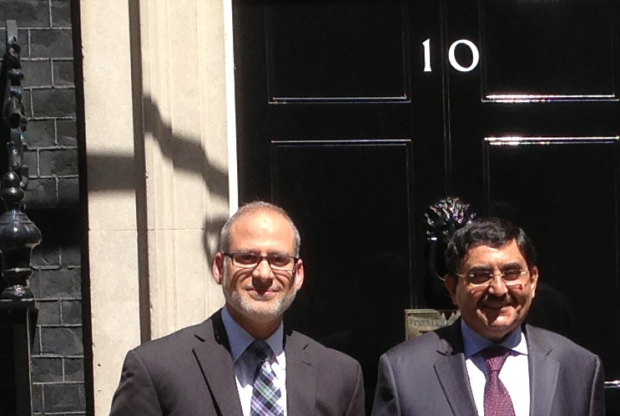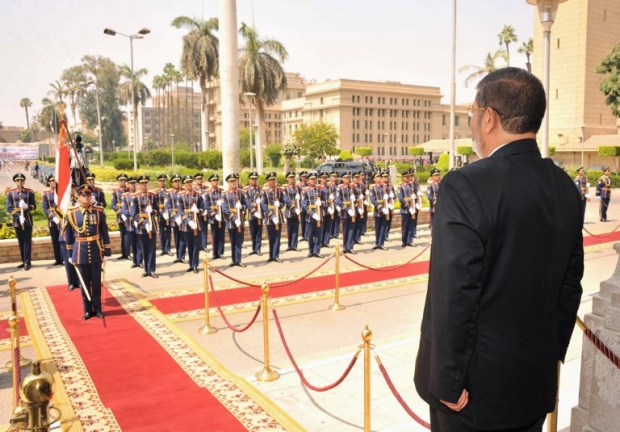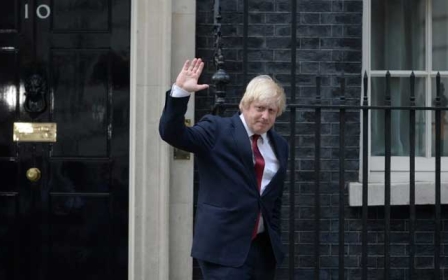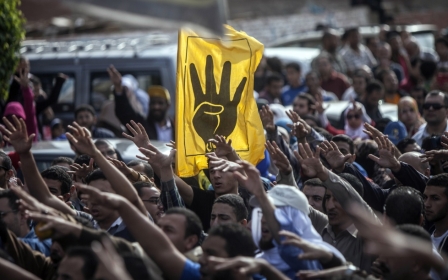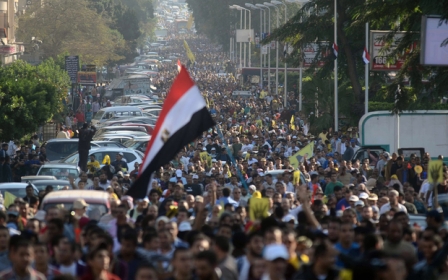Why the West cannot afford to ignore political Islam
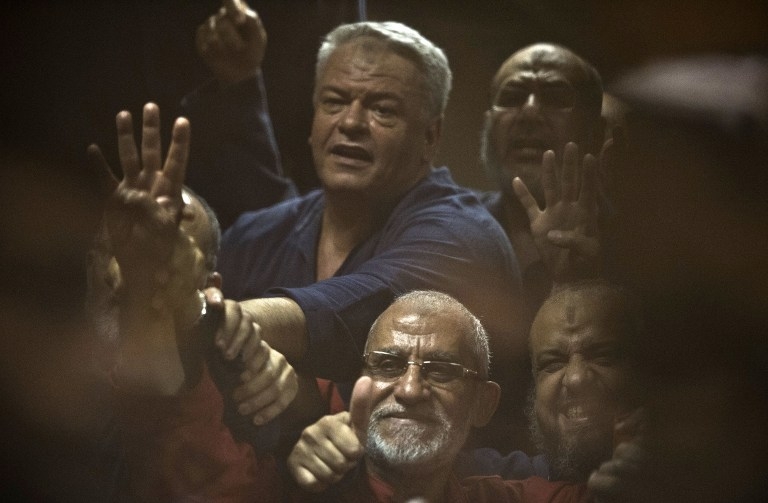
After a US presidential campaign conducted, for the most part, in the gutter, and the spectacle of national newspapers branding three top judges in Britain “enemies of the people” for a judgement which did not suit their cause, Britons and Americans are in no position to lecture Arabs on “democratic principles and liberal values".
Will the West persist with the formula that the best way to fight radical Islam is to carry on eradicating the cure?
And yet this is what the British government set out to do in their inquiry into the Muslim Brotherhood. It was a poisoned chalice. Cameron was acting on the orders of a police state (the United Arab Emirates) and against the advice of MI5. After MI6 ruled out any connection between the Brotherhood and the Luxor bus bombings, its conclusions pleased no one.
Its author, the former ambassador to Saudi Arabia, Sir John Jenkins, penned a report so long, and deliberately laced with qualification, it has never been published. That was probably his intention. A 12-page summary was issued last December on the final day before parliament's Christmas recess, buried amid much embarrassment.
Challenging received wisdom
This work has now been comprehensively dismantled by the Foreign Affairs Committee, before whom Jenkins did not dare to appear. The report challenged Jenkins’ view that the Muslim Brotherhood was a conveyor belt to Islamic militants. Rather, it said the group acted as a firewall against it.
The committee challenged the very basis on which Western foreign policy to the Middle East has been conducted since September 11, 2001
This issue is key to the message of a host of self-appointed, and government-funded Muslim “experts”, generally poachers-turned-gamekeepers, who claim that Islamism in all its forms merely presents different paths to the same destination, a Caliphate, a totalitarian theocracy.
By according political Islam its proper place in the spectrum of democratic transition movements, the committee challenged the very basis on which Western foreign policy to the Middle East has been conducted since September 11, 2001.
But I leave it to others to hammer that one out. What I want to concentrate on here is the hypocrisy and double standards of holding a values-based debate at all.
Force and power
The MPs questioned the appointment of Jenkins, because he was an ambassador to a country which had declared the Brotherhood a terrorist organisation, and had an interest in its conclusion. What the committee omitted to say was that Saudi Arabia was an extreme form of the very qualities Jenkins was damning the Brotherhood for in his report.
What makes the absence of “democratic principles and liberal values” tolerable to the British government in Saudi Arabia, but intolerable when it comes to the Muslim Brotherhood?
It is an Islamic state. It has Sharia courts, which order gruesome punishments and public beheadings. Its state-sponsored mullahs have the power to declare other Muslims apostate. The same could be said of human rights in Iran in which Western governments are rushing to open their embassies
Does this stop successive British and US governments from having anything other than the closest of military and commercial partnerships with the Kingdom - which can be measured in billions of pounds of military sales, thousands of jobs in Lancashire, and a dogged determination to thwart any independent inquiry by MPs or Congress?
The answer is obvious: power. Saudi Arabia is a sovereign state and it is in power. If Mohamed Morsi had stayed in power in Egypt, Cameron would have had no difficulty talking to him. In May 2013, he invited his advisers to have lunch with him in Chequers. It is force and power that determines the respect Britain pays to other nations, not common values.
Can political Islam be ignored?
Political Islam has neither force nor power. It is not armed, and the committee found there was scant evidence to support claims that the Brotherhood fought alongside al-Qaeda and the Islamic State (IS) group.
Has political Islam been consigned to the dustbin of history, as Arab nationalism has been?
The committee deferred judgement on Hamas, but noted there was “rather more than a 'slightly' nationalist element to its campaign against the existence of Israel,” the word used by Neil Crompton, Director of the Middle East and North Africa at the Foreign Office.
And apart from participating in coalition governments in Tunisia and Morocco, it is not in power.
If members of the Brotherhood are either being assassinated, jailed, or driven into exile, if absolute rulers once again rule the Middle East and the Arab uprisings of 2011 are crushed, can the West afford to ignore political Islam? Has it been consigned to the dustbin of history, as Arab nationalism has been?
To me, this is the central question. On this, some interesting testimony appeared before the committee. Ibrahim Mounir, the Deputy Supreme Guide of the Muslim Brotherhood, revealed for the first time the actual size of the organisation in Egypt. He said the Brotherhood had between 900,000 and one million members in Egypt alone. This is twice the size of the Labour Party, which Jeremy Corbyn now claims is the largest party in Europe.
Like it or lump it, Islam will continue to play a role in politics in the Middle East, so the West has a choice: to work with political Islam by promoting and supporting the democratic elements within in , or treat it as a political pariah and abandon an overwhelmingly young Arab population to the twin demons of military dictatorship and Islamic dictatorship. There is a clear warning contained in the committee's words on this :" The nature of Islam makes it more likely that religion and politics will remain overlapping for the foreseeable future, and emerging democratically accountable systems will need to accommodate this."
Sondos Assem, a former foreign media coordinator in Morsi’s office, replied that the same logic was not applied to Barack Obama’s election. He won 51.1 percent of the votes, with a voter turnout of 54.9 percent and represents only 28 percent of Americans. The two elections , Morsi's and Obama's took place in the same year, 2012.
The committee concluded: “In their definitions of democracy, political Islamists have sometimes emphasised a highly mechanical understanding that equates democracy with elections, and reduces elections to an outcome of ‘winners’ and ‘losers’. There is a risk that this definition fails to take sufficient account of broader aspects of democratic culture, such as power sharing and inclusive governance.”
A silver bullet against IS
Morsi cannot speak for himself. We know from the accounts of people involved that he tried to share power by offering vice-presidential posts to leading members of the opposition, that he asked another liberal, Ayman Nour, to form a government, and that only one third of his ministers in his government were members of the Brotherhood.
So the claim that he adopted a “winner takes all mentality," which was responsible for his doomed year in power, has to be reassessed. His year in power was sabotaged, and for that the liberals who have since been ousted by Sisi, have to take their share of the responsibility.
It is by now clear what IS and al-Qaeda think about the political Islam. They correctly, from their point of view, identify it as an enemy far more dangerous to their cause than the armies bearing down on them in Mosul and Raqqa. At times of existential threat, such as these, IS brands the Brotherhood as dangerous heretics, even though they are not in either battle.
The question is whether the West accepts this logic, or whether it will still persist with the formula that the best way to fight the disease of radical Islam is to carry on eradicating its cure.
- David Hearst is editor-in-chief of Middle East Eye. He was chief foreign leader writer of The Guardian, former Associate Foreign Editor, European Editor, Moscow Bureau Chief, European Correspondent, and Ireland Correspondent. He joined The Guardian from The Scotsman, where he was education correspondent.
The views expressed in this article belong to the author and do not necessarily reflect the editorial policy of Middle East Eye.
Photo: Egyptian Muslim Brotherhood leader Mohamed Badie (C-bottom) gestures from behind the defendant's cage as he attends his trial, along with ousted Islamist president Mohamed Morsi (unseen) in Cairo on 16 June 2015 (AFP)
This article is available in French on Middle East Eye French edition.
New MEE newsletter: Jerusalem Dispatch
Sign up to get the latest insights and analysis on Israel-Palestine, alongside Turkey Unpacked and other MEE newsletters
Middle East Eye delivers independent and unrivalled coverage and analysis of the Middle East, North Africa and beyond. To learn more about republishing this content and the associated fees, please fill out this form. More about MEE can be found here.



